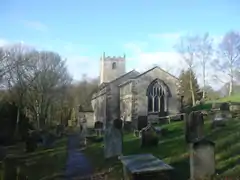Fewston
Fewston is a village and civil parish in the Harrogate district of North Yorkshire, England. It is situated north of Otley and close to Swinsty and Fewston reservoirs.
| Fewston | |
|---|---|
.svg.png.webp) Fewston Location within North Yorkshire | |
| Population | 182 (Including Blubberhouses. 2011 census)[1] |
| OS grid reference | SE177529 |
| Civil parish |
|
| District | |
| Shire county | |
| Region | |
| Country | England |
| Sovereign state | United Kingdom |
| Post town | HARROGATE |
| Postcode district | HG3 |
| Police | North Yorkshire |
| Fire | North Yorkshire |
| Ambulance | Yorkshire |

The Church of St Michael and St Lawrence is the village church. The majority of the building was constructed in 1697, although the tower dates from the 14th century.[2] The Washburn Heritage Centre, adjacent to the church, opened in February 2011.[3]
History
Fewston was an ancient parish in the Forest of Knaresborough in the West Riding of Yorkshire. It covered a wide area, and included the townships of Blubberhouses, Clifton with Norwood, Great Timble, and Thruscross.[4] All these places became separate civil parishes in 1866.[5] Fewston was transferred to the new county of North Yorkshire in 1974.
The poet Edward Fairfax lived at nearby New Hall, now submerged under the waters of Fewston Reservoir, as did Ferdinando Fairfax, 2nd Lord Fairfax of Cameron. Edward's daughters Elizabeth and Anne were baptised in the village church in 1606 and 1621 respectively, while Ferdinando's daughter Mary and son Charles were baptised there in 1606 and 1615.[6]
References
- UK Census (2011). "Local Area Report – Fewston Parish (1170217007)". Nomis. Office for National Statistics. Retrieved 11 September 2018.
- The Church of St Michael and St Lawrence, Fewston, by The Friends of Fewston Church, published 2006.
- "About Us". Washburn Heritage Centre. Retrieved 11 August 2018.
- GENUKI: extract from the National Gazetteer of Great Britain and Ireland, 1868
- Vision of Britain website
- The History and Topology of Harrogate and Knaresborough Forest by William Grainge, 1871, reprinted 1988 by M.T.D. Rigg, Guiseley.
External links
 Media related to Fewston at Wikimedia Commons
Media related to Fewston at Wikimedia Commons- Fewston with Blubberhouses church website